Leon’s Diary – September 1939 to October 1939
Leon Gladun, Polish Officer
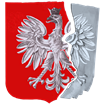
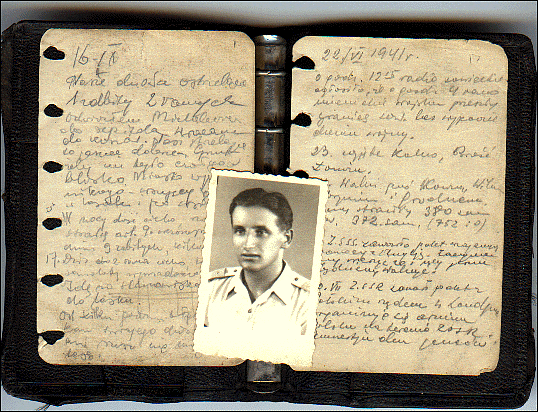
The Katyn Diary of Leon Gladun survived numerous encounters with death, both German and Russian. It chronicles battles in several campaigns and records the writer's travels through many countries on four continents. Though Leon died in 1973, the material in his diary is being used as evidence by the Commission for the Investigation of Crimes against the Polish Nation, in Warsaw. (Photo of Leon taken in Palestine).

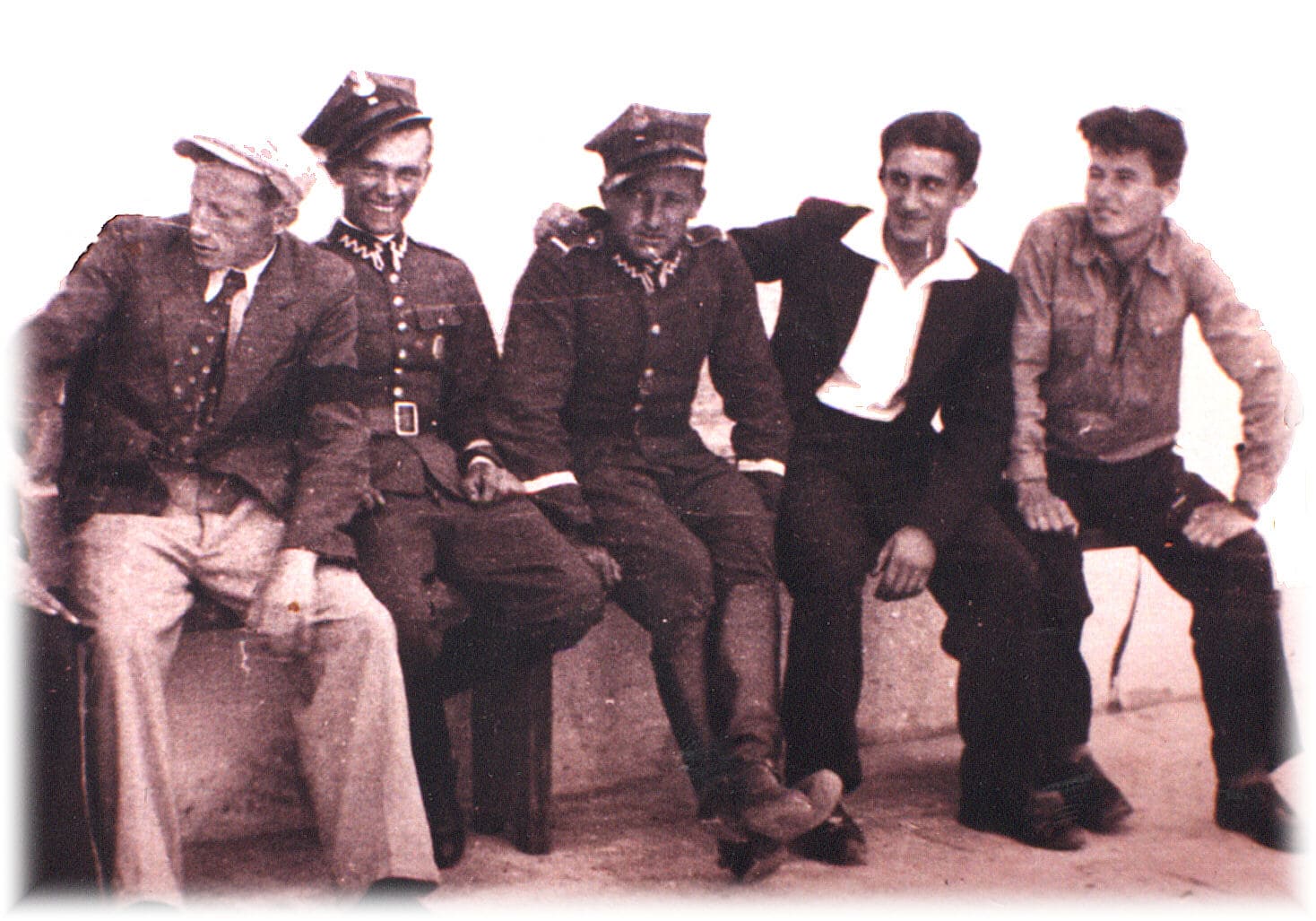
Leon (center) with friends during military service in 1935-36. Only Leon would survive the war.

Polish Light Artillery
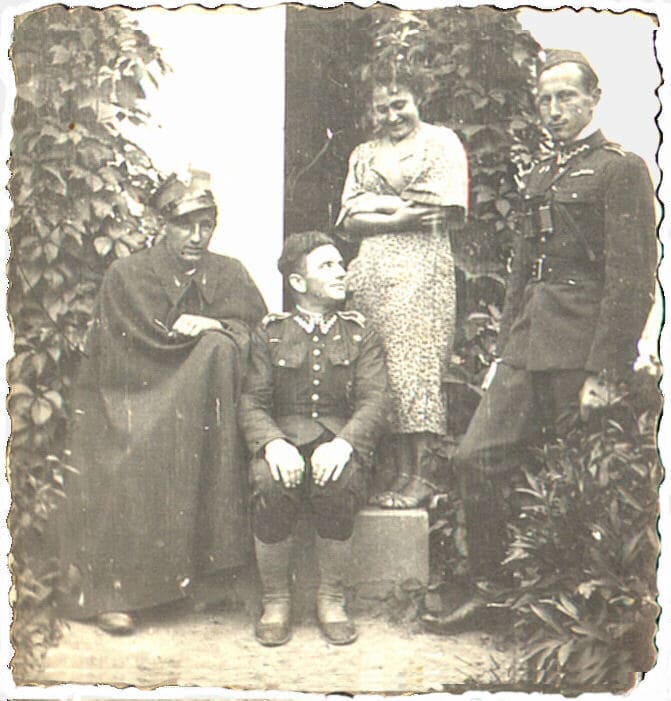
Leon (left) with friends, 1936
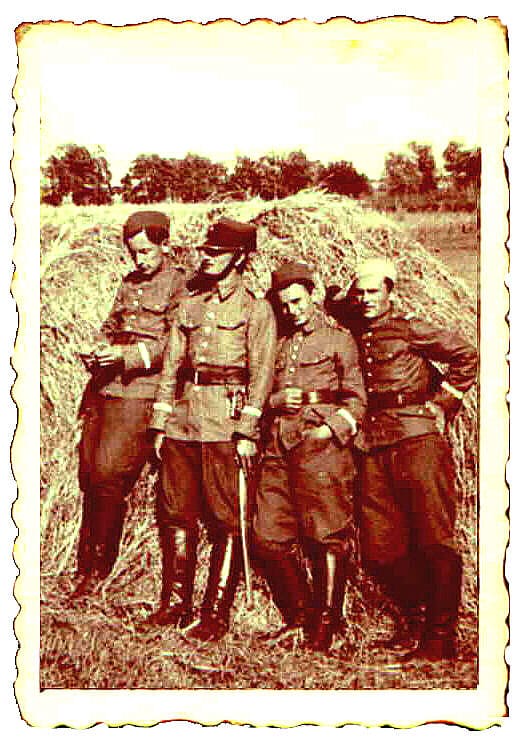
Leon (left) and buddies, 1936

Polish POW's in German Hands
Nazi Blitzkrieg: Poland, 1939/Soviet Captivity
September 16 – Our guns are shelled–I killed, 2 wounded. I drove Michalewicz to the hospital. I return to our barracks. Ours boys are firing– things are still good. As long as there’s no tanks nearby. The city is dead, nobody there–they’re all hiding somewhere in the forest or the villages. The night is fairly quiet–just rare artillery shots. As of yesterday: 9 dead and several wounded. [Fighting in southeastern Poland, north of Lwów.]
September 17 – Quiet since morning–just surveillance planes circling around. I’m going to my artillery position in the forest. For several hours I wander around searching for my gun and crew, but I just can’t find them. I heard some heartening news: apparently Kraków and Lódz are ours and 60,000 Englishman have landed in Poland! God grant that this really be true. I wandered around till evening without locating my boys and gun. I slept overnight at a peasant’s.
September 18 – This morning I learned from our soldiers that supposedly there’s a cease-fire. I return to my barracks to check out what’s really going on. Already along the way I start to hear some truly unbelievable and shocking news: Russia is moving against us and has crossed the border! The barracks are a mess and in complete anarchy–many have thrown down their arms and head for home, the rest jump on horses and escape to the west. The barracks are an incredible sight: supplies scattered about, rifles, ammunition, backpacks in piles on the ground, even [illegible] are left behind. Even before we’d managed to leave, various bands already begin their robberies. The worst is that our weapons were grabbed by civilians and as soon as we rode off on horseback, they began to operate armed with our rifles.* We waded the Bug River and are heading for Zamosc. Just past Horodlo we spent the night in a field and head out further in the morning. [*Robbers and various factions of Ukrainians and Jews who attacked civilians and even the Polish army, often in collaboration with the invading Red Army.]
September 19 – We hadn’t ridden far when at our first rest suddenly there’s a fresh report–we’re returning to our barracks because Russia has pulled back its army due to the ultimatum issued by France! A stone drops from my heart–we’re galloping back to smash those backstabbing Russian swoloczy and put things in order. And it’s probably the end for the Germans as well as Italy, Belgium, Yugoslavia, Rumania and Hungary have declared war on Germany.
Captured by the Soviets
September 23 – After a few days I’m writing further. So many unbelievable events have unfolded that it all seems like a dream! It’s simply unbelievable! After returning to the barracks at Wlodzimierz Wolynski on September 19, we went to sleep. In the morning we awake to bad news: the barracks are surrounded by Russian tanks. So many of our soldiers, horses, weapons–all of it given up without a single shot. We had an order to lay down our arms and a promise that whoever wants to leave could do so. Jozek and I decided on the West and what remains of the Polish army. But that’s bunk as the Soviets have all of us working and carrying water.
[Next two pages are largely illegible–written in pencil that has become smeared and only partial words and lines can be read. Missing parts are in brackets or indicated by ellipses….]
September 25 – 3 days […] to Shepetovka […]. In the morning at the train station we see so many Polish soldiers.
…look at newspaper pictures such as: “No change in the West. ” Our old guys get happy as children whenever anything happens, when they’re given something or get some relief. Generally the further we travel the better things get somehow. Except that we’ve gotten so sick of that canned carp that we can’t eat anymore. We’re heading for Kiev. [Leon and thousands of officers have been loaded into rail boxcars and are being shipped to an unknown destination on a trip that will take almost two weeks and even go through Moscow.]
October 1 – We arrived in Kiev at night. For the first time we received soup and czaj [tea] and in a mess room. Everybody ate like old times. Some even got sick.
October 2 – We ate a hot meal in Gomel. In Bryansk a hot meal for the third time.
Outside Moscow
October 3 – We arrived in Moscow. Everyone was anticipating getting something hot. Meanwhile they gave us a piece of bread and a bit of butter and nothing else for the rest of the day. And in addition cold and snow greeted us. The whole day we sit in Moscow and the night as well–then they move us back and forth around Moscow. We’re waiting for food and getting mad as hell from hunger. But in Moscow they never did give us anything hot–only canned food and bread. After a cold dinner we left Moscow and are now headed southwest. Apparently to Rostov, if that’s really possible.
October 4 – As soon as any food appears in the boxcar then immediately there’s political discussions, talks about the war, reminiscences about food–in a word we’re killing time as best we can. From time to time at stations we exchange some of our valuables for kopecks and in this way we have something for tobacco and a piece of bread. The only thing is that here things are expensive: tobacco is 65 kopecks while machorka [raw tobacco] is 35 kopecks.
October 5 – We crossed the Don River during the night. It seems that we are headed for Rostov. Today was like a holiday as we received bread, sugar twice, a meal of two courses and 8 buckets of kipiatok [hot water] for the wagon. I stuffed myself so much that I even started to feel sick. We wait for departure, supposedly to Zaporozhye where we’ll arrive tomorrow. It’s already evening.
October 6 – At 2 p.m. we set out further. This night wasn’t as cold as before–so we are still heading south. Now I don’t understand anything! Since morning we’ve been going north in the opposite direction! What does it all mean? They’re transporting us and transporting us without end. At 3 we arrived in Bialogrod. Hungry as hell. Supposedly it’s the end of our journey here but now it’s hard to believe anything. It turns out that we’re going further. The night is damn cold.
October 7 – Arrived at some station where supposedly we’re to end our journey. But there’s already one transport here, so it’s hard to know. So far we’ve been waiting 12 hours and it’s now the second day without food. Cold and hungry it’s hard to keep going. We’re supposed to receive a meal here, but it’s not certain. After waiting several hours for our turn we’re suddenly taken to a mess hall where we get a piece of bread and 2 glasses of tea–that’s all for two days. We go to sleep–the night is a bit warmer.
October 8 – The night was warm and the wagon didn’t move. This morning I washed myself for the first time since we started our journey. From some local boys we got fresh strings of onions and potatoes. Whatever possibly can be eaten–we eat. We didn’t even wait for the potatoes to bake and ate them half raw. We were let out of the boxcars finally after 13 days of travel. They loaded us on a narrow-gauge track which took us several kilometers to our camp. Here we were separated into groups. They crammed 190 of us to each barrack designed for 50.Unbearably crowded–there’s no room to lie down or even to sit. If it comes to living under these circumstances then lice and disease are inevitable.
Ciotkino Camp
October 9 After a Dantesque night we rose tired and aching. Breakfast that was to be for 9 a.m. we finally received at 2 p.m. Water for washing in the morning is barely enough for a spray–in a word paradise! It’s so true that we take things for granted and don’t know what we have until it’s gone. That evening in the hall discussion arose about the conduct of officers and in regards to personal affairs. A project was formed to create a court of peers.
October 10 – The second day in camp. We sit around and wait for food. Idleness and boredom. Everyone does what he can to kill the time. There’s a few books to read which circulate among the men. Some make chess pieces while others boil coffee from acorns. That evening we received a Soviet paper which was read aloud by one of our “editors.” In reality we don’t know what’s happening in the world as the news is one-sided. It’s planned that we are to build bunks for sleeping but for the time being we have to exist in these conditions.
October 11 – We’re carrying beams of wood for our own fence–in a word za….budiemi [in Russian]. Today they take us to the bania [steam bath]. The bania is one good thing so far; at least everyone was able to steam themselves as much as they wanted. With food it’s worse. They give us wasserupka [water-soup] and tea–a person walks around constantly hungry. This night is a nightmare again. People step on each other’s head going out for a pee and there’s literally not a bit of free space on the floor and air is so stale that you almost choke. I shaved my head today.
October 12 – The need to eat–this is what dominates all my time. In the end, hunger is the greatest motivator in life. In our circumstances when meal-time arrives there’s some movement and people are visibly revived. And when it comes to serving of food the situation gets raucous and fights almost erupt. People really are cattle and only in this situation can you finally see everybody without their mask. The selfishness is terrible. If only all this would quickly pass and we could return to some kind of human existence–to not hear all those people, and to find myself in normal circumstances. They’ve forced us to carry logs from the forest for the fence. On our meager diet carrying three logs has exhausted me completely! After returning to the barracks I learn of new plots from the radio: England has issued conditions that Germany and Russia are to leave Poland–in return the Germans apparently want to keep Slask and Poznanskie, and the Russians get Wolyn. We’re waiting for supper made from frozen pumpkins which I found with Stefek* on the road to the forest. [*Stefan Czarnecki, classmate from Krzemieniec Lyceum, executed at Katyn.]
Rumours and Hope
October 13 – News arrived today that 30 non-commissioned officers are departing for home. Who knows maybe I too will be at home shortly? We got supper late today–and then kipiatok and baked pumpkin suddenly appeared and I really ate my fill.
October 14 – Commotion and discussion in the barracks connected with the transport departing to Poland. Apparently we won’t be here long–there’s to be an exchange with the Germans.
October 15 – Somebody brought some more news: Essen has been taken, 20,000 Polish prisoners have been freed and the Rhine has been crossed. Again something to keep us busy for a few hours.
October 16 – Today the rest of the non-commissioned officers left camp, supposedly for Poland, but it’s not known for sure, maybe to a new camp. At least now it’s so-so […] there’s 130 of us in a barrack where there was 190 […] we won’t be here long.
October 17 – [Illegible-appears to have been erased.]
October 18 – News: apparently Kutrzeba and Bortnowski [Polish generals] have joined together. Warsaw is still defending herself–25,000 inhabitants have been killed by German bombardment.
October 19 – The French are near […] the German government is fleeing to Poland to Krakow–so states the radio.
October 20 – This morning we smoked machorowka which Józio* bought for 2.50. Further news: Finland is defending herself against Russia, and Sweden and Norway have joined her. The Germans are near Hrubieszow […] Great Poland is still defending herself. Vivat! [*Józef Szmalstych, classmate from Krzemieniec Lyceum, executed at Katyn.]
October 21 – So far we finished building our bunks. Supposedly we’re to leave here […] the spring.
October 22 – [Illegible–pencil writing is smeared.]
October 23 – Tomorrow we’re supposed to leave here […] for Szepetowka. They say there’s to be an exchange with the Germans.
October 24 – Today 400 […] and non-commissioned officers
departed. They received rations for 4 days, therefore […].
October 25 – [Illegible]
October 27 – Today we received a real feast–for the first time I’m satiated. Everyone is still talking that we’ll be leaving for sure–but it seems never to arrive. Perhaps we’re finally going as there’s to be a quarantine in Szepetowka.
Christopher Jacek Gladun was born in 1951 and grew up in Canada to where his family emigrated from England as displaced persons. Sadly, Chris died in Toronto in March 2003. He held a diploma in Journalism from the Niagara College and a BA in Polish Language & Literature from the University of Toronto. Chris also acted as interviewer and researcher for the documentary film “Rescued From Death in Siberia”.
This content is now maintained by the Kresy-Siberia Group, which Chris was a charter member of and which is taking his website and his research work forward.